Review of the year
)
What a year it has been: death, disease and danger every time you turn on the TV – and a world-renowned creative industry in tatters, with thousands of desperate freelancers trying to survive on Jobseeker’s Allowance. But even though it was an apocalyptic hell out there, somehow, TV survived. Just.
After years of declining ratings, Covid-19 created captive audiences – allowing tone-deaf schedulers to crow about their success. Though with everything cancelled, all we really got were repeats to watch – again and again – to rather reasonable success.
Foreign shoots stopped and everyone tried to pretend the UK was just as interesting. One beleaguered Scottish island received visits from Bob Mortimer and Paul Whitehouse, Jeremy Clarkson and Joanna Lumley all within the same week.
As indies went bust, the only safe way to make money in TV was to get into the PPE game as everyone suited up to get Covid-proof. Daily tests doubled in price, but how else were we going to get our socially distanced soaps or audience-free studio shows?
Even worse, the BBC now has to deal with a very unimpressed, unfriendly government – something that affects every viewer, whether you are watching in Bradford or from your ‘Islington townhouse’.
But let’s not get depressed again: here’s Broadcast’s rundown of the best, the worst and the least infectious stories of the year in TV.
JanuaryThe new year was so promising, with a shiny new government led by ex-HIGNIFY host Boris Johnson, who’d surely make us laugh all year long (spoiler alert: he didn’t). One show did start with a bang, though: BBC1’s reboot of Dracula starring actor Claes Bang, though it tailed off towards the end.

Dancing On Ice featured its first-ever same-sex pairing, with H from Steps skating with another man, but the real glory belonged to small Scottish indie Bandicoot, which went stratospheric with The Masked Singer on ITV and scored one of the biggest launches in several years. Bizarrely, ITV had originally rejected the Korean format when offered it – something execs now try to laugh off in their briefings.
Sadly, we also lost a slew of TV icons: RIP Derek Acorah, Derek Fowlds, Nicholas Parsons and Terry Jones.
February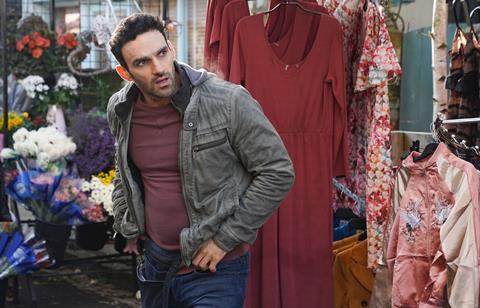
Soap operas had a good month as Coronation Street celebrated its 10,000th episode while EastEnders reached its 35th anniversary.
Talking of drama: no one fainted or clutched their pearls when This Morning host Phillip Schofield revealed he was gay live on air.
However, the entire industry was stunned and saddened when Love Island presenter Caroline Flack shockingly took her own life – she was just 40 years old.
Meanwhile, in current affairs, more and more foreign news reports were talking about a new virus in Wuhan…
MarchCovid-19 became the only show in town as the prime minister began daily briefings live on BBC1. But despite the statistics and slides (or maybe because of them), no one could understand it – and everyone watched Matt Lucas’s baked potato instead.
The first programming victim of the pandemic was The Steph Show on Channel 4, despite being rapidly retooled, soon had no viewers, and was pulled within weeks.
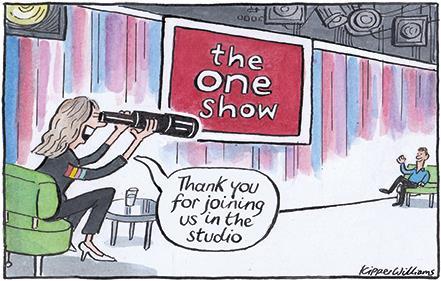
The One Show went socially distanced and presenters sat well apart from their shiny-faced studio guests, who hadn’t realised they could have stayed at home baking banana bread and had the chat via Zoom.
ITV launched Julian Fellowes’ Belgravia, but no one really cared as we were all bingeing on the madness of Joe Exotic and Carole Baskin in Netflix’s Tiger King instead.
AprilAs the lockdown began to bite and the TV industry totally shut down, things turned weird: Piers Morgan became our new hero with his attacks on the government on Good Morning Britain. Meanwhile, The Queen (you know, her from The Crown) cheered us up as she invoked the wartime spirit in a televised address on the ’rona to nearly 24 million subjects.
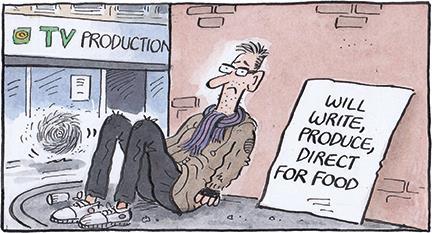
ITV scored big with its Millionaire-themed drama Quiz, but the real sensation was BBC3’s Normal People, making instant stars of Paul Mescal and Daisy Edgar-Jones – the daughter of Sky Arts controller Phil.
There were sad farewells to even more TV favourites: RIP Eddie Large, Lynn Faulds-Wood, Jill Gascoine, Honor Blackman and Tim Brooke-Taylor.
May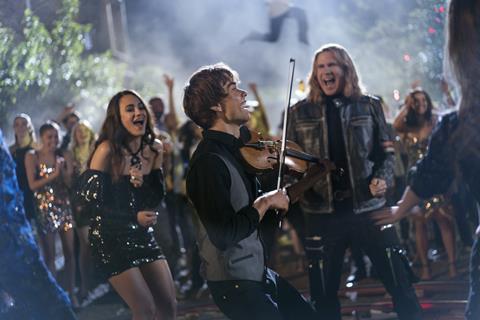
With everything cancelled, repeats became the new box sets. VE Day went ahead complete with televised ‘super-spreader’ street parties, but Eurovision was cancelled (thankfully, Will Ferrell’s even camper spoof The Story Of Fire Saga on Netflix helped fill the hole).
In the US, the sheer horror of the footage of George Floyd’s death kickstarted the #BlackLivesMatter movement, which immediately began to look at the TV industry – specifically its lack of black, Asian and minority ethnic representation.
JuneTim Davie was unveiled as the next BBC director general as anxiety over historical racism ramped up.
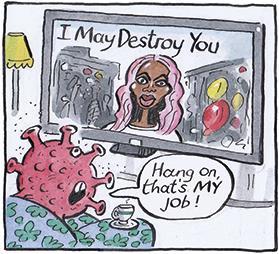
Despite the announcement of the BBC’s much-needed £100m diversity masterplan, the headlines were all about Little Britain, The Mighty Boosh and League Of Gentlemen being pulled for featuring white comedians blacking up. Even Ant and Dec were found guilty of historical racial insensitivity, while John Cleese raged against the BBC as “cowardly and gutless” for pulling the ‘Germans’ episode of Fawlty Towers.
After running out of episodes, EastEnders came off air, while Micheala Cole stunned everyone with her powerful drama I May Destroy You – possibly the year’s best.
July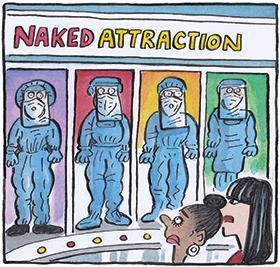
Both C4 and Channel 5 unveiled diversity initiatives, while the former’s specialist factual boss Fatima Salaria exited to join Naked, kickstarting an exodus of staff at Fremantle as Boundless folded into her new-look indie.
The Baftas were televised in a virtual ceremony that no one enjoyed – not even the winners.
Finally, the government announced lockdown restrictions were easing and everyone relaxed – temporarily.
August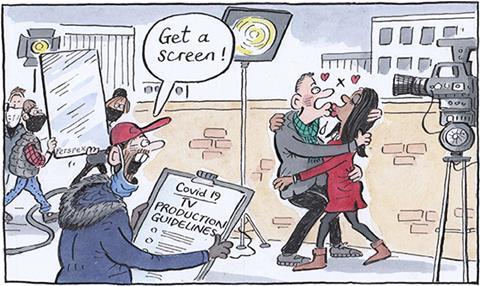
The Edinburgh TV Festival went online, I Hate Suzie debuted on Sky Atlantic and the BBC got its knickers in a twist (again) as it ended free TV licences for (some) over-75s.
Meanwhile, in a clever-but-cringey, Covid-beating twist, EastEnders returned to production using the real-life partners of its actors for kissing scenes. Other shows went with Perspex screens and distanced seating arrangements.
SeptemberITV showed solidarity with dance troupe Diversity after it performed a BLM-inspired routine on Britain’s Got Talent and received 1,200 complaints from outraged racists.
After keeping everyone laughing in lockdown, Canadian comedy Schitt’s Creek rightfully swept the board at the US Emmys and C5 unearthed a smash hit with its reboot of All Creatures Great And Small.
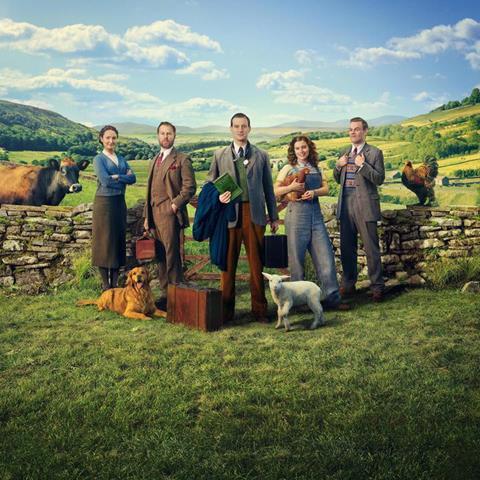
Tim Davie formally began his run at the top of the BBC by warning staff to stay off social media unless they wanted to be fired – while BBC commissioners secretly briefed indies to ignore schedules as they only wanted ideas that could be hits on iPlayer.
Another TV legend – Dame Diana Rigg – died aged 82.
October
Top Gear debuted on BBC1, delivering its best ratings in several years.
Sky History series The Chop was given the… err… chop after viewers pointed out a contestant’s tattoos appeared to be neo-Nazi symbols.
An even bigger TV scandal was Netflix’s Emily In Paris, which instantly became the most loved/hated comedy ever.
After much delay, Strictly returned in special Covid-safe bubbles and with no studio audience, but Little Mix The Search was postponed after catching coronavirus.
Maxxx finally aired on C4 after being pulled in April, while Spitting Image returned on BritBox.
Telly legends Mary Berry and Maureen Lipman became dames, Phil Redmond was knighted and we said a final goodbye to Frank Bough and Bobby Ball.
November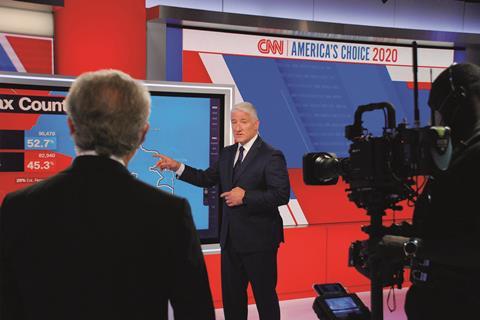
With yet another lockdown, there was only one thing to watch: the US presidential election. However, days of delays, denials and denunciations meant agonising viewing and no sleep for news anchors. Bizarrely, US news channels immediately began to remember their duty and started censoring the lies of bad loser Trump.
Back in Blighty, there was yet another royal scandal at the BBC as Panorama was accused of dirty dealings over how it secured Martin Bashir’s legendary 1995 interview with Princess Diana.
For everyone else, the return of The Crown – finally featuring Diana – was much more important. Finally, a fond farewell to two of TV’s funniest. RIP, Geoffrey Palmer and John Sessions.
December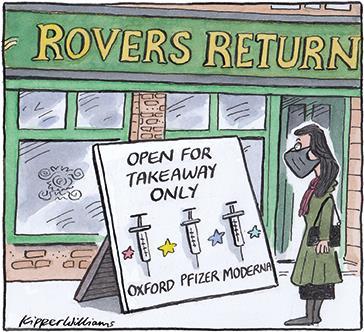
While it was a relief that Coronation Street’s aging cast survived Covid to celebrate its 60th anniversary, Netflix’s announcement that it will have spent $1bn (£750m) on UK programming this year provided some Christmas cheer to a beleaguered industry.
The streamer, currently worth a mere $215bn (£160bn), was feeling so generous that it followed up with a present for the British taxman – revealing its plans to start declaring the revenues it makes in this country for the first time.
Meanwhile, the BBC confirmed what Broadcast had already revealed – it is chopping channel controllers in favour of digital-first genre bosses.
Finally, with a new US president, a new vaccine and new impetus in commissioning – the real shot in the arm the TV industry needs – and maybe some financial assistance from Rishi to all the freelancers, there might even be a renaissance next year. Even if Brexit means we will all starve to death.
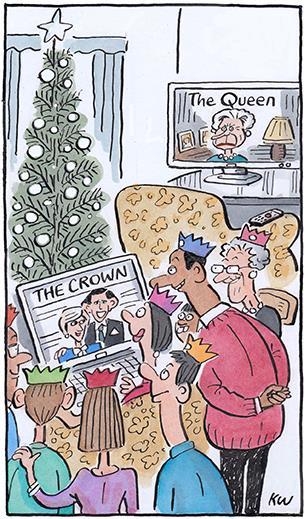

)
)
)
)
)
)
)
)
)
)
)
)
)
)
)
)
)
)
)
)
)
)
)
)
)
)
)
)
)
)
)
)
)
)
)
)
)
)
)
)
)
)
)
)
)
)
)
)
)
)
)
)
)
)
)
)
)
)
)
)
)
)
)
)
)
)
)
)
)
)
)
)
)
)
)
)
)
)
)
)
)
)
)
)
)
)
)
)
)
)
)
)
)
)
)
)
)
)
)
)
)
)
)
)
)
)
)
)
)
)
)
)
)
)
)
)
)
)
)
)
)
)
)
)
)
)
)
)
)
)
)
)
)
)
)
)
)
)
.png/fit-in/500x9999/filters:no_upscale())
)
)
)
)
)
)
)
)
)
)
)
)
)
)
)
)
)
)
)
)
)
)
)
)
)
)
)
)
)
)
)
)
)
)
)
)
)
)
)
)
)
)
)
)
)
)
)
)
)
)
)
)
)
)
)
)
)
)
)
)
)
)
)
)
)
)
)
)
)
)
)
)
)
)
)

)
)
)
)
)
)

)
)
)
)
)
)
)
)
)
)
)
)
)
)
)
)






